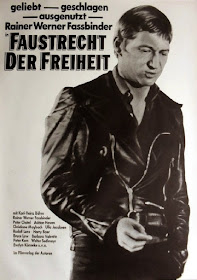Rainer Werner Fassbinder’s
Fox and His Friends offers the sad
parable of a simple man who realizes his dreams, only to suffer unexpected
consequences. The director plays the starring role, and he occupies an
effective performance space blending unaffected looseness with subtle strains
of pathos. As the protagonist falls deeper and deeper into a humiliating abyss,
with those around him forever preying on his naïveté, we, the viewers, aren’t
asked to weep for the character but rather to empathize. This distinction is
key, for while Fox and His Friends
follows a somewhat conventional narrative path, Fassbinder strives for
docudrama realism instead of manipulative melodrama. One could argue the film
suffers for this choice, since the ending could have had greater impact, but
one could also argue that restraint is what makes the familiar storyline
palatable. That is, for viewers who aren’t put off by the story’s gay themes
and copious amounts of male full-frontal nudity.
In modern Germany, Fox
(Fassbinder) works as a sideshow attraction in a carnival run by his boyfriend.
When the boyfriend is arrested, Fox casts about for his next situation. First
he seeks shelter with his alcoholic sister, and then he turns prostitute for
men prowling public bathrooms. Optimistic to an almost delusional degree, Fox
buys a lottery ticket one day, certain he’ll win. He does, scoring a prize of
500,000 deutsche marks. Most of the film explores how acquaintances react to
Fox’s newfound wealth, and because many people behave in predatory ways, a
maudlin theme emerges. Fox represents those who believe financial windfalls can
fix every problem, but never take the time to learn how money works. Fox’s
fortune begins to slip from his hands virtually the moment he takes possession. Also woven into Fassbiner’s depressing story are issues of class. Fox’s first
rich patron, Max (Karlheinz Böhm), treats Fox as a sexual
plaything barely worth contempt until Fox becomes rich. The protagonist’s second patron,
Eugen (Peter Chatel), behaves even more callously, convincing Fox to make a huge business
investment. Desperate to find a place among the sophisticated set, Fox plays along until he
realizes he’s being used, but by that point, his self-image has suffered
irreparable harm.
In the merciless way of his best stories, Fassbiner takes
Fox’s decline to a logical conclusion, so viewers shouldn’t look for the
glimmers of hope a Hollywood version of similar material would surely provide.
The aforementioned homoerotic content provides more than titillation, because
the othering of gays in West German society circa the mid-’70s is an important
component of the storytelling. Fox discovers how those above his social station mask themselves in the name of
assimilation, and he also discovers what happens when straight society sees
through those masks. Additionally, a sequence set in Morocco reinforces the trope
of sex workers desperate to escape, or at least survive, poverty by any means
possible.
Fox and His Friends: GROOVY


Yeah, I admire this movie more than I "enjoy" it or would recommended it. As much as I appreciate the balls on Fassbinder to make a "gay film" chiefly about class rather than sexual preference (since the gayness of the characters is plain and non-controversial from the beginning within their subculture), the protagonist is so plainly being taken advantage of, the whole movie is just waiting for him to wake up to something that's glaringly obvious to the audience and every character around him. It's really hard to do that without making your main character look like a nincompoop. It's not like that sort of willful blindness never happens, but there had to be a way to make it more compelling. Maybe my heart is hard, but I haven't yet seen a Fassbinder film that I can connect with. I'm just not the audience for melodrama if you can call it that.
ReplyDeleteAh, I noticed that you specifically said it wasn't melodrama. Guess I'm a little fuzzy on the definition. For sure, there's no levity in the film that I can remember. The protagonist is pitiful, but realistic.
ReplyDelete